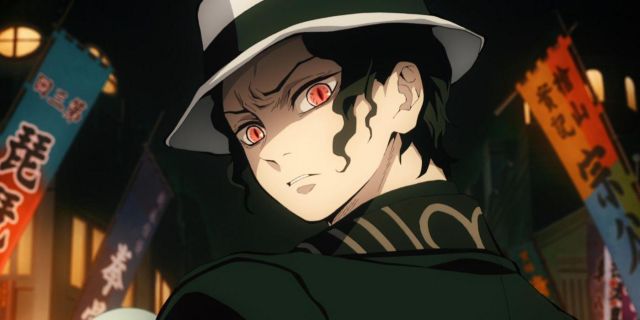Koyoharu Gotouge’s Demon Slayer pits sword-slinging demon slayers against the flesh-eating demons who prey on humanity, but that is not the only conflict at play. Many demons are portrayed not as beasts from Hell, but as people who were mutated into monsters while still retaining a piece of their long-lost humanity — including protagonist Tanjiro Kamado’s sister Nezuko.
Some demons are actually at war with their own demon status, most of all the series’ primary antagonist Muzan Kibutsuji. He is like a vampire in many ways, a sun-fearing superhuman who preys on humans and is cruelly arrogant. But unlike Dracula or the famed antihero Alucard, Muzan does not revel in his vampire-like status. He’s a vampire in every way that counts, but he subverts it with his desperate attempt to not be like one any longer, hence his quest for the blue spider lily.
Demon Slayer’s Muzan Kibutsuji & the Empty Strength of Vampires

Muzan lost his humanity when he became Japan’s first-ever demon, and has since grown into his role as the progenitor of and leader of all other demons. He is much like a classic Western vampire, from his extreme vulnerability to sunlight to his race’s predation on humanity to his cocky arrogance and cruelty as a superhuman creature with a centuries-long lifespan. With his fancy outfits, cool castle and smug confidence, Muzan is a total vampire at heart — but all his strength in Demon Slayer is proving to be totally empty.
Vampires are often hedonistic and arrogant creatures who aim to fill the endless time and feel good about themselves, but they’re really just in denial — and so are Muzan and his demon followers. Vampires and demons alike identify strongly with their immortality and superhuman abilities, but it’s ultimately for nothing. Strength for its own sake means very little, and immortality even less. A person needs something more personal and fulfilling to give their life meaning, even if they’re a short-lived and mortal human, and turning into a vampire or demon won’t help.
Becoming such creatures just gives someone like Muzan more time to reflect on, or agonize over, how empty and frustrating their life really is. They also alienate themselves from society and everyone they know in the process, making vampirism and demon status a curse rather than a boon. No fancy castle, magical ability or Dracula-inspired aristocrat outfit will ever change that. This has even been explored in anime series like Call of the Night, where vampires discouraged the male lead from becoming like them because it’s a lonely, endless existence that gives precious little in return.
Demon Slayer’s Muzan Adds Depth to the Classic Vampire Archetype

Demon Slayer’s Muzan can be thought of as an off-brand vampire who doesn’t fear garlic and crucifixes, but he twists the archetype in more ways. Unlike most fictional vampires, Muzan is painfully aware of how empty and frustrating his supernatural status can be, and he strives to regain his humanity somehow. He even mimics humans with his modern clothing and how he was once seen wandering Tokyo’s nighttime streets with his false family. Muzan may be the first and strongest demon, but this “vampire” doesn’t aim to live it up as a hedonistic party animal who lords his power over the terrified villages around his castle. Quite the opposite, he wants to be more like those villagers instead.
Muzan is using his Upper Moons to find the blue spider lily, the key to restoring his long-lost humanity so he can walk under the sunlight once again. He doesn’t wish to create his own vampiric kingdom or prove his superiority to humanity; he would rather give it all up to see the sun again and not fear its bright rays. Muzan may be fiction’s first “vampire” who doesn’t want to be one anymore, wisely recognizing vampirism as a burden that’s not worth it. He is at war — not with pitchfork- and torch-wielding villagers or a vampire slayer, but with his own demonic status, totally subverting the vampire archetype and giving Muzan a fresh new struggle.
If Muzan weren’t such a villain, his struggle would even be sympathetic. As it stands now, he is a “vampire” overlord who must be slain to free humanity from his cruel influence. If he is taken out, then the Upper Moons won’t stand a chance and the demon race will go extinct. Muzan is a tragic off-brand vampire who explores the archetype in fascinating ways, but ultimately, a Nichrin sword through the heart is likely the only way to end Demon Slayer properly and save the world from darkness.















Leave a Reply